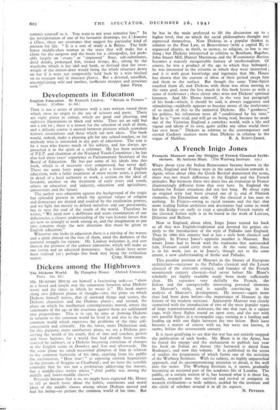Developments in Education
English Education. By Kenneth Lindsay. " Britain in Pictures " Series. (Collins. 3s. 6d.)
THIS is not a series of pictures with a text written round them which owes its origin to the use of scissors and paste. There are eight plates in colour, which are good and pleasing, and eighteen illustrations in black and white. They are an odd but not a job lot ; there is a reason for the selection of each of them, and a delicate course is steered between pictures which reawaken historic associations and those which stir new ideas. The book would, indeed, make a pleasing gift for any school-teacher, or for anybody who is interested in any part of education. The text is by a man who knows much of his subject, and has always ap- proached it in the spirit of a reformer. He has been secretary of P.E.P. and chairman of the National Youth Committee ; he has also had three years' experience as Parliamentary Secretary of the Board of Education. He has put some of his ideals into this book, which is of necessity very compressed, but never dull. There are some forty pages, which give a history of English education, with a fuller treatment of more recent years, a picture in detail of a local authority at work, a section on the ideal of freedom, another on the treatment of early years and youth, others on education and industry, education and agriculture, universities and the future.
The author sees education against the background of the tragic but splendid present in which the spiritual values of religion and democracy are denied and assailed by the totalitarian powers, and we fight not merely to defend ourselves and our possessions, but to save the soul of the youth of the world. Therefore he writes, " We need now a deliberate and acute examination of our deficiencies, a clearer understanding of the vast historic forces that are now so strongly at work among us, and the imagination to put into concrete shape the new direction that must be given to English education." Wherever one looks in education there is a stirring of the waters and a spirit abroad on the face of them, amid the darkness of the national struggle for victory. Mr. Lindsay welcomes it, and sees therein the promise of the unborn tomorrow, which will make us one nation and an educated democracy. Such ideals have never been realised yet ; perhaps this book may bring the realisation






















 Previous page
Previous page